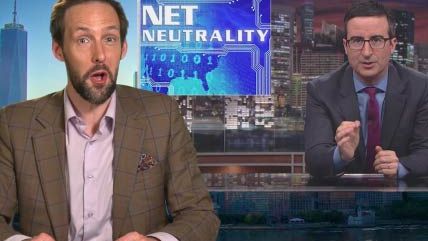Net Neutrality Nixed: Why John Oliver Is Wrong
The internet did just fine before bureaucrats started micromanaging it.

Democrats and progressives are concerned that the internet is about to descend into a corporate hellscape since the Federal Communications Commission (FCC) is moving to repeal Net Neutrality regulations, which prohibit internet service providers (ISPs) from blocking particular sites or throttling traffic from specific services. We tackle the issue in the latest episode of Mostly Weekly. The idea that Net Neutrality and Title II regulations are a vital barricade protecting the internet is an interesting position to arrive at given that a free-and-open internet managed to exist without these edicts for decades. Net Neutrality rules are still on the books, but the FCC made a procedural vote on Thursday to begin the prospect of peeling off Obama-era internet regulations like an old Band-Aid.
The main progressive arguments in favor of Net Neutrality are really arguments guarding against hypotheticals: that ISPs could otherwise block and censor content (they never have) or that they'll run their operations like shakedowns, requiring content providers to pay up or slow their traffic to molasses. The main documented instance of an ISP favoring one content provider over others wasn't sinister collusion. Metro PCS offered unlimited YouTube in a budget data plan but not unlimited Hulu and Netflix, because YouTube had a compression system that could be adapted to the carrier's low-bandwidth network. In a different context, critics might have applauded Metro PCS, since bought by T-Mobile, for bringing more options to lower-income customers.
Net Neutrality is a proxy battle over what type of internet we want to have—one characterized by technocratic regulations or one based on innovation and emergent order. Progessives are generally suspicious of complex systems existing without powerful regulators present and accounted for. Small-government folks are repulsed by bureaucrats in general, and think the internet will fair better in a state of benign neglect. The FCC has come down on the side of an organic internet, instead of treating the internet more like a public utility.
We don't know how the internet is going to evolve over time, but neither do the government administrators trying to rein it in. But given the record of free-market innovation vs. government-regulated services, the odds are with market forces and entrepreneurs.
Written and performed by Andrew Heaton, with writing assistance from Sarah Rose Siskind and David Fried.
Edited by Austin Bragg and Sarah Rose Siskind.
Produced by Meredith and Austin Bragg.
Theme Song: Frozen by Surfer Blood.
